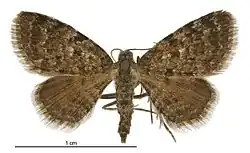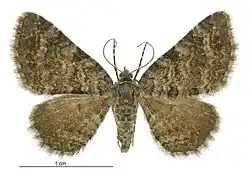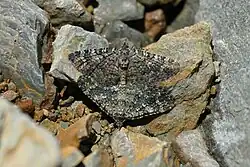Chloroclystis nereis
| Chloroclystis nereis | |
|---|---|

| |
| Male specimen | |

| |
| Female specimen | |
| Scientific classification | |
| Kingdom: | Animalia |
| Phylum: | Arthropoda |
| Class: | Insecta |
| Order: | Lepidoptera |
| Family: | Geometridae |
| Genus: | Chloroclystis |
| Species: | C. nereis
|
| Binomial name | |
| Chloroclystis nereis | |
| Synonyms | |
| |
Chloroclystis nereis is a moth in the family Geometridae.[2] It was described by Edward Meyrick in 1888. It is endemic to New Zealand.
Taxonomy
This species was first described by Edward Meyrick in 1888 and was originally named Pasiphila nereis.[3] George Hudson discussed this species under the name Chloroclystis nereis in his 1928 book The butterflies and moths of New Zealand.[4]
Description

Meyrick described this species as follows:
Male, female. — 15-21 mm. Head, palpi, thorax, and abdomen grey sprinkled with blackish-grey and whitish, sides of thorax and base of abdomen (in fresh specimens) tinged with blue-greenish ; palpi 2. Antennae whitish annulated with black, ciliations in male 1⁄2. Legs blackish, middle and posterior pair irrorated with whitish, apex of all joints whitish. Forewings with hindmargin bowed, oblique, slightly sinuate above anal angle ; light grey, suffused with light blue-greenish (in fresh specimens) ; numerous curved waved darker grey or blackish-grey lines, alternating with a partial irregular white irroration ; anterior edge of median band from 1⁄3 of costa to 1⁄3 of inner margin, curved ; posterior edge from 2⁄3 of costa to 2⁄3 of inner margin, sinuate inwards beneath costa, and above and below middle ; median band towards margins, and a hindmarginal band interrupted beneath costa, obscurely suffused with darker grey, especially near costa ; a grey discal spot, sometimes obsolete ; an interrupted blackish hindmarginal line : cilia whitish, barred with grey, and with an obscure grey line, bars darker on basal half. Hindwings with hindmargin unevenly rounded ; grey, with obscure darker waved lines, more distinct towards inner margin, and somewhat irrorated with white in intervals ; an obscure dark grey discal spot, often merged in one of the lines ; cilia as hi forewings, but more obscure.[3]
Distribution
This species is endemic to New Zealand.
Habitat and hosts
The favoured habitat of this species consists of mountainous areas.[3][5] The larvae feed inside the flower heads of Celmisia lindsayi.[6] Adult moths have been shown to pollinate Celmisia discolor, Celmisia gracilenta and Helichrysum selago.[7]
Behaviour
C. nereis is day flying. Adults are on wing in January and February.[5]
References
- ^ Yu, Dicky Sick Ki. "Chloroclystis nereis Meyrick 1888". Home of Ichneumonoidea. Taxapad. Archived from the original on 25 March 2016. Retrieved 26 April 2013.
- ^ Beccaloni, G.; Scoble, M.; Kitching, I.; Simonsen, T.; Robinson, G.; Pitkin, B.; Hine, A.; Lyal, C., eds. (2003). "Chloroclystis_auctorum nereis". The Global Lepidoptera Names Index. Natural History Museum. Retrieved April 28, 2018.
- ^ a b c Meyrick, Edward (1888). "Notes on New Zealand Geometrina". Transactions and Proceedings of the New Zealand Institute. 20: 47–62 – via Biodiversity Heritage Library.
 This article incorporates text from this source, which is in the public domain.
This article incorporates text from this source, which is in the public domain.
- ^ Hudson, G. V. (1928), The butterflies and moths of New Zealand, Illustrator: George Hudson, Wellington: Ferguson and Osborn Limited, p. 96, LCCN 88133764, OCLC 25449322, Wikidata Q58593286BHL page 61899707
 This article incorporates text from this source, which is in the public domain.
This article incorporates text from this source, which is in the public domain.
- ^ a b Hudson, George Vernon (1898). New Zealand moths and butterflies (Macro-lepidoptera). London: West, Newman & co. p. 43. doi:10.5962/bhl.title.7912.
- ^ B. Patrick (January 1982). "Lepidoptera of Danseys Pass, Otago". New Zealand Entomologist. 7 (3): 332–336. doi:10.1080/00779962.1982.9722418. ISSN 0077-9962. Wikidata Q54755440.
- ^ Richard B. Primack (July 1983). "Insect pollination in the New Zealand mountain flora". New Zealand Journal of Botany. 21 (3): 317–333. doi:10.1080/0028825X.1983.10428561. ISSN 0028-825X. Wikidata Q54669862.